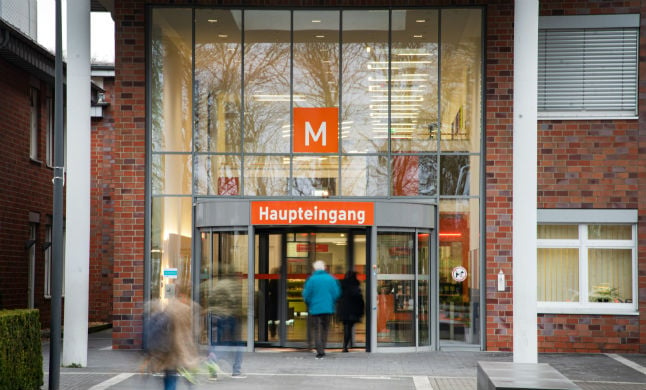NORTH RHINE-WESTPHALIA
Coronavirus: Number of cases in Germany doubles to 129
The number of people infected with the novel coronavirus in Germany jumped sharply to 129 on Sunday, official data showed, as the interior minister said he expected a vaccine by the end of the year.
Published: 1 March 2020 16:51 CET

The Maria Hilf hospital in Mönchengladbach in North Rhine-Westphalia. where a doctor worked who was later found to have been infected with the virus. Photo: Jana Bauch/dpa
The latest tally given by the Robert Koch Institute, Germany's centre for disease control and prevention, showed that the number of cases had almost doubled from 66 on Saturday morning.
More than half are in North Rhine-Westphalia, Germany's most populous state where an infected couple attended carnival celebrations.
The deadly virus has now reached nine of Germany's 16 states, with Frankfurt, Hamburg and Bremen among the cities reporting their first COVID-19 cases.
Speaking to the mass-daily Bild am Sonntag, Interior Minister Horst Seehofer said he did not see a swift end to the virus's spread but was optimistic a cure could be found.
“I estimate that a vaccine will be available by the end of year,” he said, adding that he himself had stopped shaking people's hands.
Asked whether Germany would go so far as to close off access to cities or regions, he said “such a scenario would be a last resort”.
The state of Bavaria announced four new cases on Sunday, including an employee at machine tool manufacturer DMG Mori.
The company has asked its 1,600 employees not to come to work on Monday.
Several hundred people meanwhile were released from quarantine in the district of Heinsberg in North Rhine-Westphalia, allowing them to leave their homes again.
The cluster there has been linked to a carnival gathering on February 15. Four kindergarten children in Heinsberg also tested positive for the new coronavirus at the weekend, apparently contracted through a member of staff.
Organisers of the Leipzig book fair however said the event, which attracted over 280,000 people last year, would go ahead as planned from March 12-15.
Germany has cancelled several major events in a bid to curb the spread of the virus, including this week's ITB travel trade fair in Berlin.
The Michelin Guide restaurant star rating awards slated to take place in Hamburg on Tuesday have also been called off.
As the coronavirus continues to disrupt air travel and supply chains around the world, Finance Minister Olaf Scholz said the government stood ready to stimulate Germany's export-driven economy if the impact worsened.
“If the situation calls for it, we have the means to launch a fiscal stimulus package,” he told Die Welt newspaper.
Url copied to clipboard!


 Please whitelist us to continue reading.
Please whitelist us to continue reading.
Member comments